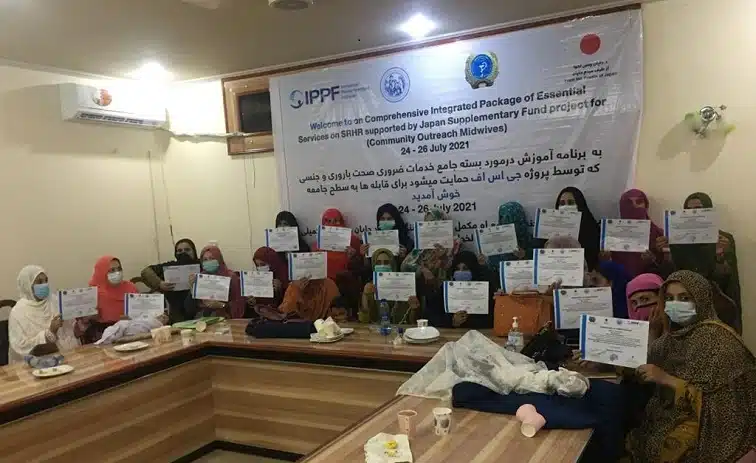In a first-of-its-kind initiative, 150 midwives will be trained through a simulation- based digital platform to reach over 45,000 households in 10 provinces by February 2022.
Afghanistan, with its fragile health infrastructure and rampant illiteracy, has the lives of its women and children shrouded in uncertainty. It is one of the countries with a high maternal mortality rate (678 per 100,000 live births). Combined with the ongoing conflict in Afghanistan and COVID-19 pandemic, the challenges have increased manifold.
After such a testing time, there is a ray of hope offered by a project by the International Planned Parenthood Federation, through its implementing partner, Afghan Family Guidance Association (AFGA), and Government of Japan’s commitment to strengthen maternal and child health in Afghanistan.
In a first of its kind initiative, the project will be providing comprehensive maternal and child services through150-midwives in 10 conflict prone provinces of the country and will reach the doorsteps of more than 45,000 households.
The project is a novel ‘‘midwifery-led technology-enabled intervention’’ and covers provinces with poor maternal and child health indicators —- Kabul, Nangarhar, Herat, Balkh, Parwan, Kapisa, Laghman, Bamiyan, Badakhshan and Samangan.
Emphasising the need of such a project at this juncture, Najibullah Samim, Chief Executive Officer at Afghan Family Guidance Association said: “The COVID-19 pandemic has compelled public health organizations to think of innovative ways to train healthcare providers and reach women and girls with appropriate lifesaving services. This project aims to help save the lives of thousands of women and girls. Midwives are the backbone of the country’s healthcare system, particularly in the rural areas and the training that they will receive will equip them with knowledge and expertise to serve the women of Afghanistan in times to come.”
As per Maternal Mortality Estimation Inter-Agency Group (MMEIG) estimates, Afghanistan is one of the countries with high maternal mortality (678 per 100,000 live births). The high maternal mortality rate in Afghanistan is largely attributed to post-partum haemorrhage (59.9%) and preeclampsia/eclampsia (19.8%). Only 58.8% of the births are attended by skilled birth attendants (SBA) and 48% of deliveries are institutional or in hospitals.
In order to curb the number of such mishaps, midwives will be trained on using smart phone integrated antenatal care kit which will include off-the-shelf devices to measure blood pressure, haemoglobin, random blood sugar, urine tests and monitor fetal heartbeat and growth) for provision of high quality antenatal and post-natal services. These devices will allow midwives to test women in the privacy and comfort of their homes. This will ensure early diagnosis, timely referral and effective management of pregnancy related complications and significantly reduce the deaths and serious complications among mothers and the new-borns.
The midwives will be specifically trained in ‘Basic emergency obstetric, new-born care (BEmONC)’, ‘Preeclampsia (a condition that causes high blood pressure during pregnancy and after labour and which can be serious, if left untreated) and post-partum haemorrhage (PPH) management’ (a serious medical condition where pregnant woman suffer heavy bleeding after giving birth), refresher training on management of complicated deliveries and use of reproductive health kits.
Midwives will be strongly supported on field through a virtual consultation centre staffed by gynaecologists and equipped with appropriate technologies. This is further strengthened by organized referral linkages with different levels of public health facilities managed by the Ministry of Public Health Afghanistan. The project also involves strong engagement with key community and religious leaders to ensure community participation and create an enabling environment.
It is hoped that the project would herald a new dawn for the women of Afghanistan.

















